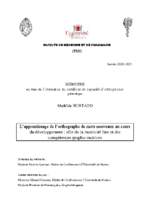Mémoire
Hurtado Mathilde
L’apprentissage de l’orthographe de mots nouveaux au cours du développement : rôle de la motricité fine et des compétences grapho-motrices
FrançaisConsulter le texte intégral (format PDF)

Résumé
Français
L’apprentissage de l’orthographe de mots nouveaux au cours du développement : rôle de la motricité fine et des compétences grapho-motrices
De nombreuses études se sont intéressées à l’apprentissage de l’orthographe. Récemment, des travaux ont montré que les compétences en motricité fine exerçaient une influence sur l’apprentissage du langage écrit. Cependant, certains auteurs soulèvent l’importance de distinguer la motricité fine, la graphomotricité et l’écriture dans la mesure où ces compétences peuvent jouer un rôle distinct dans cet apprentissage. Cette étude s’est donc intéressée aux liens qui unissent la motricité fine, la graphomotricité, l’écriture et l’apprentissage de l’orthographe chez des élèves de CE2 et de 6ème. Nous nous attendions à ce que l’apprentissage de l’orthographe soit davantage relié à la graphomotricité et à l’écriture, par rapport à la motricité fine, comme l’ont soulevé certains travaux. Une tâche expérimentale d’apprentissage de l’orthographe de mots nouveaux a donc été élaborée. Les élèves ont été confrontés à deux situations d’apprentissage : en condition d’écriture et d’épellation. Nous avons également évalué la motricité fine, la graphomotricité, l’écriture et la lecture. Des analyses de corrélations entre nos variables ont été réalisées. De manière générale, nous avons obtenu un nombre insuffisant de liens de corrélations pour déterminer si les compétences motrices exerçaient une influence sur l’apprentissage de l’orthographe. Cependant, nos résultats ont montré des corrélations plus fortes entre la graphomotricité, l’écriture et les performances en orthographe et en lecture. Les recherches nécessitent d’être poursuivies afin de comprendre l’implication du système moteur dans l’apprentissage de l’orthographe et proposer de nouvelles perspectives de prises en soin en orthophonie.
Mots-clés libres : orthographe, motricité fine, graphomotricité, écriture manuscrite, lecture.
- Français (langue) -- Orthographe
- Lecture -- Tests
English
Many studies have focused on spelling acquisition. Recently, research has shown that fine motor skills influence the development of reading and spelling. However, some authors point out the importance of distinguishing between fine motor skills, graphomotor skills and writing skills, as these skills may play a distinct role in learning to spell. This study looked at the links between fine motor skills, graphomotor skills, writing and spelling acquisition in third and sixth grade students. We expected that spelling acquisition would be more related to graphomotor skills and writing, as opposed to fine motor skills, as some work has suggested. An experimental task for spelling acquisition of new words was therefore developed. The students were confronted with two learning situations: writing and spelling conditions. We also assessed fine motor skills, graphomotor skills, writing and reading. Correlation analyses between our variables were performed. In general, we obtained an insufficient number of correlations to determine whether motor skills had an influence on spelling acquisition. However, our results showed stronger correlations between graphomotor skills, handwriting, and spelling and reading performance. Further research is needed to understand the involvement of the motor system in spelling acquisition and to propose new perspectives for speech therapy.
Keywords : spelling acquisition, fine motor skills, graphomotor skills, handwriting, spelling.
Notice
- Diplôme :
- Orthophonie 5 (2017)
- Établissement de soutenance :
- Université de Poitiers
- UFR, institut ou école :
- UFR Médecine et Pharmacie
- Domaine de recherche :
- Orthophonie
- Directeur(s) du travail :
- Pauline Quemart
- Date de soutenance :
- 30 août 2021
- Membres du jury :
- Pauline Quemart, Manuel Gimenes, Florence de Montesquieu
Menu :
-
-
à propos d'UPétille
-
Voir aussi
Annexe :

-
Une question ?
Avec le service Ubib.fr, posez votre question par chat à un bibliothécaire dans la fenêtre ci-dessous ou par messagerie électronique 7j/7 - 24h/24h, une réponse vous sera adressée sous 48h.
Accédez au formulaire...
Université de Poitiers - 15, rue de l'Hôtel Dieu - 86034 POITIERS Cedex - France - Tél : (33) (0)5 49 45 30 00 - Fax : (33) (0)5 49 45 30 50
petille@support.univ-poitiers.fr -
Crédits et mentions légales
